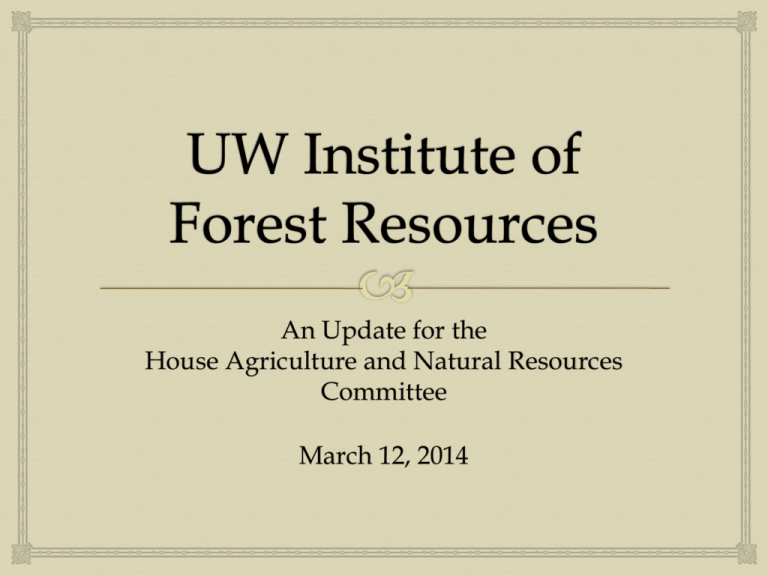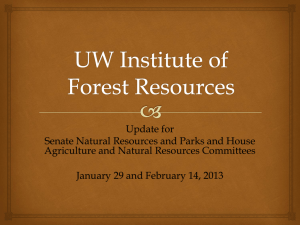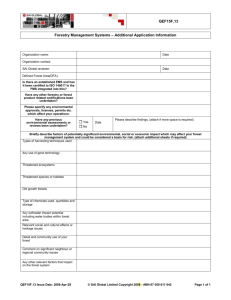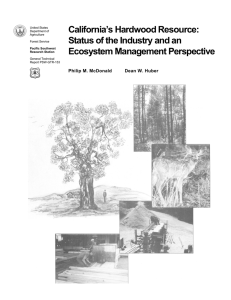UW Institute of Forest Resources
advertisement

An Update for the House Agriculture and Natural Resources Committee March 12, 2014 Institute’s Charge In 2011, the Legislature directed the Institute to organize itself to pursue coordinated interdisciplinary research and outreach, covering forestry issues along with emerging issues related to forest and environmental sciences, and to improve the understanding of complex forestry and related issues for stakeholders, policymakers, and other interested parties – including the public. Focus on Issues 1. Retention of sustainable working forests 2. Forest health including wildfire risks and fuel abatement 3. Development of environmental service markets 4. Economic health and sustainability of the forest sector 5. Enhancement of wildlife habitat and biodiversity 6. Biomass utilization for bioenergy and other bioproducts Focus on Issues 7. Watershed protection and sustainable management 8. Forest productivity, value-added markets and resiliency 9. Interrelationships between climate change and natural resources 10. Restoration of resilient and sustainable forest ecosystems 11. Human dimensions of forest resources including tribal communities Project Collaborators Help ensure that Institute projects are of significant value to existing or emerging natural resource issues Provide expertise in carrying out the project Provide either in-kind contributions or direct funds Match federal funds provided by the McIntireStennis Cooperative Forestry Research Program Project Collaborators Washington Hardwoods Commission Western Hardwood Association WDFW Washington Forest Protection Association Greenwood Resources Wilderness Society Nature Conservancy Vanport Sealaska Port Blakely Evergreen Building Products Association Softwood Export Council Project Collaborators Interra Intertribal Timber Council Central OR Intergovernmental Council US Forest Service University of Montana UW Office of Environmental Stewardship and Sustainability Colorado State University Northern Arizona University Six Projects Funded by Institute Projects are funded for two-years – starting in FY 13. $775,000 of McIntire-Stennis funds plus a direct match of same. Defining Reference Conditions for Restoration of Fire-Prone Forest Ecosystems: Lessons from The Collaborative Forest Landscape Restoration Program. Charles Halpern, Lauren Urgenson, Clare Ryan, Ernesto Alvarado, and Jonathan Bakker. ($160K) Photo courtesy The Nature Conservancy/John Marshall Climate Change and Washington State Biofuels Industry: Impacts and Critical Technical Innovations. Renata Bura, Richard Gustafson, Susan Bolton, Josh Lawler and Luke Rogers. ($180K) Resolution of a Forest Management Dispute. Stanley T. Asah and E. David Ford. ($45K) Assessing the Impact of Trade Policies on the Competitiveness of Wood Exports from Washington State. Ivan Eastin and Indroneil Ganguly. ($180K) Feasibility of a Wolf Economy for Washington. John Marzluff, Stanley Asah, and Aaron Wirsing. ($175K) Assessing the Status of Washington’s Hardwood Resource. B. Bruce Bare, John Perez-Garcia and Luke Rogers. ($34K) Individual Project Reports Assessing the Impact of Trade Policies on the Competitiveness of Wood Exports from Washington State Feasibility of a Wolf Economy for Washington Assessing the Status of Washington’s Hardwood Resource






